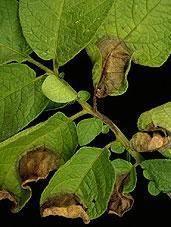
Potato blight spots have been picked up in crops across Lincolnshire, Cambridgeshire and Suffolk. Wet weather has disrupted and delayed blight protection programmes, leaving crops unprotected and vulnerable to infection, warned independent specialist potato agronomist, David Hudson. “It's not too late to contain the outbreaks, but growers must now switch to cymoxanil-based products to get some curative and semi-systemic activity, alternated with Shirlan to counter the tuber blight risk,” he advised.
“Most crops still have the beneficial legacy of a good fungicide programme this season. But there are new spores coming in all the time and latent blight infection that has been suppressed within the crop has been able to break out since applications have been delayed.” The internal crop lesions are mainly on the lower stems, which give rise to the greatest concern for tuber blight infection. Shirlan has strong activity against tuber blight infective zoospores and will help to dry up spore producing lesions.
With many crops still relatively backward after delayed planting in the spring, Hudson said there is still a long way to go. “Growers vigilance to maintain effective protection of the foliage, as well as the developing tubers, remains crucial.”
Although some growers have already started lifting maincrop Maris Piper, up to a fifth of crops have yet to even attain full ground coverage and many still have predominantly small tubers below 20mm in size.
“It is going to create a real dilemma for growers come desiccation, with some already putting back predicted lifting dates. That's going to create extra pressure on harvesting systems into the autumn,” he added.
Despite the wet weather Hudson reports slugs do not yet appear to be a problem in potato crops, although aphids remain a significant threat - particularly on the backward crops. He said: “Aphid populations are already well above the traditional ADAS treatment thresholds and still increasing in many crops, particularly in the Cambridgeshire Fens. Heavy feeding activity could result in further checks in already reduced crop growth, with serious consequences for yield.
“We are also seeing high populations of the limey-green Aphis gossypii (Melon Cotton Aphid), a vector of Potato Leaf Roll Virus and which is naturally resistant to pirimicarb. Growers may need to move to Plenum to control this and all other aphid species, including insecticide resistant strains of Myzus persicae (Peach Potato Aphid).”



